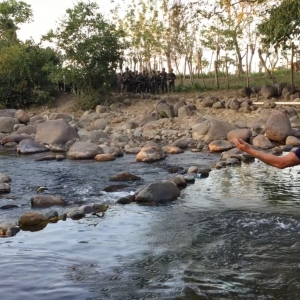The Stream, October 16, 2020: Legionella Could Be Lurking In The Water Supply of Reopened Buildings
YOUR GLOBAL RUNDOWN
- Stagnant water in recently reopened buildings in the United States is raising concerns about the spread of legionnaire’s disease.
- Of 850 asked, over 30 percent of women in African countries say they’ve been harassed or assaulted while collecting water during the pandemic.
- A new model for detecting arsenic in drinking water in India reveals the problem is more widespread than previously thought.
The impact of water shutoffs in California is largely unknown due to a lack of data.
“Not only is there no plan for what to do about the crisis of water debt and potential mass water shutoffs next year, but we don’t even know the full scope of the problem.” – Jonathan Nelson, the policy director at the Community Water Center. California water providers have reported revenue losses between 20 and 50 percent since water shutoff moratoriums took place since the coronavirus pandemic caused unprecedented unemployment, but a lack of concrete data leaves the true impact largely unknown. CapRadio reports that Laurel Firestone, who serves on the State Water Resources Control Board, said the board understands the impact the pandemic has had on both households and utility companies. The board announced a new data collection effort in early October to answer basic questions about the state of both water systems and ratepayers.
In context:
THE LATEST WATERNEWS FROM CIRCLE OF BLUE
Chart: Customer Water Debt Data in 12 U.S. Cities – Circle of Blue used public records requests to collect data on overdue bills from a dozen large U.S. cities.
Michigan Allocates $20 Million to Relieve Customer Water Debts – The state is using federal CARES Act funding to help residents pay off past-due water bills that accrued during the pandemic.
The Spread of Legionnaire’s Disease Could Be Exacerbated By Covid-19 Shutdowns
Concerns about the spread of legionnaire’s disease have been heightened by the Covid-19 pandemic, reports Ensia. Legionella, the bacteria that causes legionnaire’s disease, multiplies in stagnant water. Building shutdowns may have caused a buildup of the bacteria and as those buildings begin to reopen, they could be unknowingly spreading the disease.
Legionella is now the leading cause of reported waterborne disease in the United States, and experts say it may only get worse if it isn’t controlled. An aging population and aging infrastructure are driving factors in the rise of Legionella, along with climate-change-related factors like longer summers and increased rainfall. Scientists have argued for a more coordinated effort from the federal government in controlling the spread of the bacteria, especially as the country recovers from the Covid-19 pandemic.
In context:
- Water Contamination Risks Lurk in Plumbing of Idled Buildings
- ‘Deadly’ Consequences If Stagnant Water in Shuttered Buildings Is Not Properly Addressed
TODAY’S TOP STORIES, TOLD IN NUMBERS
31 PERCENT OF WOMEN
A new report from the International Rescue Committee found that 31 percent of women in 15 African countries reported incidents of harassment and sexual violence while collecting water. The need for water has increased due to hygiene precautions during the coronavirus pandemic, a burden that is generally put on women and girls. Schools have also closed, which have pushed young girls into bearing water collection responsibilities. In a safety audit included in the report, women suggested installing an increased number of water and sanitation service points to reduce the frequency of water collection and the direct delivery of non-food items such as water and PPE to protect women and girls from the dangers associated with collecting basic needs.
18 TO 30 MILLION PEOPLE
A new hazard model found that 18-30 million people in India are at a high risk of being exposed to arsenic through their drinking water supply, reports Hindustan Times . The prediction model that can be used to inform groundwater quality testing and environmental public health tracking programs. The model highlights the need for random and systematic sampling of all wells used for drinking water, not just water in known high hazard areas.
WHAT WE’RE READING
Recommendations from the Circle of Blue team to start off your weekend.
- The third route: Using extreme decentralization to create resilient urban water systems from ScienceDirect
- Climate Wars: Darfur from the BBC series Compass
- This is my message to the western world—your civilization is killing life on Earth from the Guardian
Jane is a Communications Associate for Circle of Blue. She writes The Stream and has covered domestic and international water issues for Circle of Blue. She is a recent graduate of Grand Valley State University, where she studied Multimedia Journalism and Women, Gender and Sexuality Studies. During her time at Grand Valley, she was the host of the Community Service Learning Center podcast Be the Change. Currently based in Grand Rapids, Michigan, Jane enjoys listening to music, reading and spending time outdoors.






Leave a Reply
Want to join the discussion?Feel free to contribute!